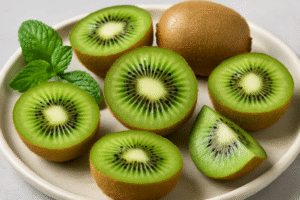
Tired of digestive problems that leave you bloated or sluggish? This small green fruit might be your gut’s most effective ally. Packed with enzymes and fiber, kiwi has proven effects on digestion, making it one of the most underrated tools for natural gut health.
What Makes Kiwi Unique for Digestion?
Kiwi isn’t just rich in vitamin C—it contains a powerful digestive enzyme called actinidin. Actinidin supports the breakdown of proteins in the stomach, much like your body’s natural enzymes. This process accelerates gastric emptying and reduces the discomfort often experienced after eating protein-rich meals.
Beyond enzymes, kiwi is an excellent source of soluble and insoluble fiber. This combination helps regulate stool consistency, supports smooth intestinal movement, and promotes overall digestive comfort.
Scientifically Proven Benefits of Kiwi for Gut Health
Multiple studies confirm that kiwi has real digestive benefits:
- A clinical trial published in the Asia Pacific Journal of Clinical Nutrition found that eating two kiwis daily improved bowel regularity and reduced bloating in adults with mild constipation.
- Comparative research in Advances in Food and Nutrition Research showed kiwi performed as well as prune extract or psyllium for managing constipation—often with fewer side effects.
- A 2021 study published in Nutrients demonstrated significant improvement in constipation-predominant IBS patients who consumed kiwi daily, without triggering bloating or cramps.
These effects make kiwi a simple yet effective fruit to include in any gut-friendly diet.
How Kiwi Helps with Bloating and Constipation
Kiwi tackles two major gut issues:
- Bloating: The enzyme actinidin improves how quickly food is broken down, reducing fermentation and gas.
- Constipation: The fiber in kiwi promotes healthy stool formation and easier elimination.
Unlike harsh laxatives, kiwi supports these functions gently and naturally.
Is Kiwi Good for People with IBS?
Yes—especially the green variety. Kiwi is low in FODMAPs, the fermentable carbs that often trigger IBS symptoms. That makes it ideal for those with sensitive guts.
Because of its fiber-enzyme combo, kiwi is one of the few fruits that supports IBS relief without side effects.
How to Eat Kiwi for Maximum Benefits
To get the most from kiwi:
- Eat 2 green kiwis daily
- Consume with seeds and, if tolerated, the skin for extra fiber
Timing tips:
- Morning: Jumpstart digestion
- After meals: Help break down protein
- Before bed: Promote overnight gut movement
Try it sliced over yogurt, blended in smoothies, or just halved and eaten with a spoon.
🍽️ Kiwi in Your Daily Gut Routine
A simple routine could look like this:
- AM: 1 kiwi before breakfast
- Lunch: Add to salads or grain bowls
- PM: 1 kiwi after dinner
You can also combine kiwi with gut-friendly fruits like papaya, pineapple, or berries for enhanced effect.
❓FAQ
Q: Can I eat kiwi on an empty stomach?
A: Yes. Eating kiwi first thing may increase its digestive enzyme activity.
Q: Is golden kiwi as effective as green kiwi?
A: Green kiwi has more actinidin and fiber, making it better for gut health.
Q: How long does it take to see results?
A: Most people report changes in digestion within 2 to 4 days of daily consumption.
Fruit Health Content Specialist